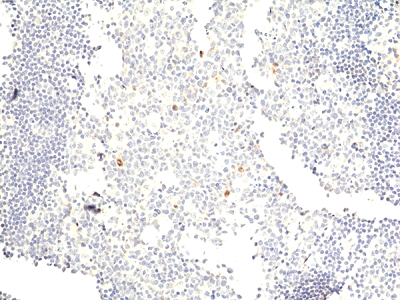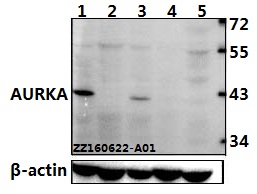
anti-Phospho-Aurora A (Thr288)/Aurora B (Thr232)/Aurora C (Thr198), Rabbit Monoclonal (RM454)
REV-31-1346-00
ApplicationsWestern Blot, ImmunoHistoChemistry
Product group Antibodies
ReactivityHuman
TargetAURKA
Overview
- SupplierRevMAb Biosciences
- Product Nameanti-Phospho-Aurora A (Thr288)/Aurora B (Thr232)/Aurora C (Thr198), Rabbit Monoclonal (RM454)
- Delivery Days Customer2
- ApplicationsWestern Blot, ImmunoHistoChemistry
- CertificationResearch Use Only
- ClonalityMonoclonal
- Clone IDRM454
- Gene ID6790
- Target nameAURKA
- Target descriptionaurora kinase A
- Target synonymsAIK, ARK1, AURA, BTAK, PPP1R47, STK15, STK6, STK7, aurora kinase A, aurora 2, aurora/IPL1-like kinase, aurora/IPL1-related kinase 1, breast tumor-amplified kinase, protein phosphatase 1, regulatory subunit 47, serine/threonine protein kinase 15, serine/threonine-protein kinase 6, serine/threonine-protein kinase aurora-A
- HostRabbit
- IsotypeIgG
- Protein IDO14965
- Protein NameAurora kinase A
- Scientific DescriptionAurora kinases belong to a highly conserved family of mitotic serine/threonine kinases with three members identified among mammals: Aurora A, B, and C. Studies on the temporal expression pattern and subcellular localization of Aurora kinases in mitotic cells suggest an association with mitotic structure. Aurora kinase functional influences span from G2 phase to cytokinesis and may be involved in key cell cycle events such as centrosome duplication, chromosome bi-orientation and segregation, cleavage furrow positioning, and ingression. Aurora A is a 46 kDa protein that plays a role in cell cycle regulation during anaphase and/or telophase, in relation to the function of the centrosome/spindle pole region during chromosome segregation. Aurora A plays a key role during tumor development and progression and is overexpressed in many human cancers including breast, ovarian and colorectal. Aurora B plays a critical role in cell division and chromosome-microtubule interactions during mitosis. Aurora B kinase is a serine/threonine kinase which is the enzymatic core of the Chromosomal Passenger Complex (CPC). This complex functions in chromosome alignment and separation, histone modification and cytokinesis. Aurora B was found to be overexpressed in several malignant cancers and is involved in promoting tumor development and progression. Aurora kinase C may play a part in organizing microtubules in relation to the function of the centrosome/spindle pole during mitosis. This protein is localized to centrosome from anaphase to cytokinesis. Elevated expression levels are seen only in a subset of cancer cells such as HepG2, HuH7 and HeLa cells. - Recombinant Antibody. This antibody reacts to human Aurora A/B/C only when phosphorylated at either Thr288, Thr232 or Thr198 respectively. There is no cross-reactivity to Aurora A/B/C that is not phosphorylated. Applications: IHC, WB. Clone: RM454. Isotype: Rabbit IgG. Formulation: Liquid. 50% Glycerol/PBS with 1% BSA and 0.09% sodium azide. Aurora kinases belong to a highly conserved family of mitotic serine/threonine kinases with three members identified among mammals: Aurora A, B, and C. Studies on the temporal expression pattern and subcellular localization of Aurora kinases in mitotic cells suggest an association with mitotic structure. Aurora kinase functional influences span from G2 phase to cytokinesis and may be involved in key cell cycle events such as centrosome duplication, chromosome bi-orientation and segregation, cleavage furrow positioning, and ingression. Aurora A is a 46 kDa protein that plays a role in cell cycle regulation during anaphase and/or telophase, in relation to the function of the centrosome/spindle pole region during chromosome segregation. Aurora A plays a key role during tumor development and progression and is overexpressed in many human cancers including breast, ovarian and colorectal. Aurora B plays a critical role in cell division and chromosome-microtubule interactions during mitosis. Aurora B kinase is a serine/threonine kinase which is the enzymatic core of the Chromosomal Passenger Complex (CPC). This complex functions in chromosome alignment and separation, histone modification and cytokinesis. Aurora B was found to be overexpressed in several malignant cancers and is involved in promoting tumor development and progression. Aurora kinase C may play a part in organizing microtubules in relation to the function of the centrosome/spindle pole during mitosis. This protein is localized to centrosome from anaphase to cytokinesis. Elevated expression levels are seen only in a subset of cancer cells such as HepG2, HuH7 and HeLa cells.
- ReactivityHuman
- Storage Instruction-20°C,2°C to 8°C
- UNSPSC41116161







